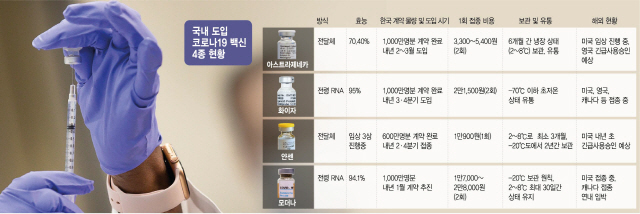[코로나19 3차 대유행]
■Government “secure vaccine for 26 million people”
It is difficult to determine a vaccine schedule that has not been completed
Pfizer’s actual vaccination only takes 3 quarters
Expert “6~7 months until group immunity
It is inevitable to maintain quarantine until next winter”
 viewer
viewer
Following AstraZeneca, the government completed a contract to purchase a vaccine for the novel coronavirus infection (Corona 19) of Pfizer and Janssen, and Korea has secured a total of 26 million vaccines. Each vaccine is scheduled to be introduced in Korea sequentially from the first quarter of next year. The government plans to complete the vaccination before the influenza (flu) outbreak next year, but it is unclear whether it will be practical. Among the vaccines secured by the government, the Janssen vaccine is still undergoing clinical trials, so it is unclear when it will be available with approval from the health authorities. In addition, the Pfizer vaccine, which is actually being vaccinated around the world, such as the United States, can be introduced in Korea only in the third and fourth quarters of next year. As a result, experts said, “It will take a considerable amount of time to achieve group immunity through vaccination due to the delay in the introduction of the vaccine. It doesn’t seem to exist.”
Yang Dong-gyo, head of the Medical Safety Prevention Bureau of the Centers for Disease Control and Prevention, announced on the 24th that “Pfizer has signed a vaccine purchase contract for 20 million times (10 million people) and Janssen 6 million times (6 million people).”
Pfizer vaccine is currently being vaccinated in major countries around the world, such as the United States, the United Kingdom, and Canada, as well as in Latin America and the Middle East, and development is fast. Although it showed 95% of the preventive effect in clinical practice, the cost of a single dose is 19.5 dollars (25,000 won), which is higher than other vaccines. In addition, there is a disadvantage of maintaining a cryogenic state below -70°C when distributing the vaccine.
The vaccine Janssen is developing is a virus vector (carrier) type vaccine, similar to AstraZeneca, which has already completed a contract for 10 million people. The government originally planned to purchase 4 million Janssen vaccines, but finally secured an additional 2 million doses through cooperation with the manufacturer. The vaccine costs $10 (1,900 won), two to three times more expensive than the AstraZeneca vaccine, but it can be effective with just one dose. However, unlike Pfizer, Moder, or vaccine, it is currently undergoing phase 3 clinical trials, so it is difficult to determine when the actual vaccination will be possible after obtaining approval from the health authorities.
With this contract, Korea has completed a contract to purchase a total of 3 types of COVID-19 vaccine for 26 million people. Director Yang said, “AstraZeneca will be introduced in Korea in the first quarter of next year, Janssen will be introduced in the second quarter, and Pfizer will be introduced in the third quarter.” It doesn’t come in all at once,” he said. In addition to the United States, Canada and other countries also announced plans to introduce a vaccine for Modena, which was approved for emergency use, saying, “We are negotiating with the goal of signing a contract in January next year.”
When the quarantine authorities introduce a vaccine, the Korean Ministry of Food and Drug Safety proceeds with the approval process. Vaccine development companies can submit non-clinical and clinical data to the KFDA for preliminary review before approval. Until the 22nd, Pfizer, AstraZeneca, Janssen and others have applied for pre-review of nonclinical tests and quality data. As the spread of Corona 19 is serious, the Ministry of Food and Drug Safety is expected to proceed with the approval process faster than usual. However, in the case of AstraZeneca and Janssen, it is difficult to determine the vaccination schedule as Phase 3 clinical trials have not yet been completed. Accordingly, it is highly likely that the actual vaccination in Korea will take place around the second half of next year. The government plans to proceed with vaccination as much as possible before next November, when the influenza outbreak, as 60-70% of the population must be vaccinated for collective immunity, but the current schedule seems difficult to achieve. Kim Woo-joo, a professor of infectious medicine at the University of Guro Hospital, said, “In order for group immunity to be achieved, it takes about 6 to 7 months after vaccination begins.” “At the current rate of introduction, the Korean people must be with Corona 19 next winter. I will.”
/ Reporter Jihye Seo [email protected]
< 저작권자 ⓒ 서울경제, 무단 전재 및 재배포 금지 >
